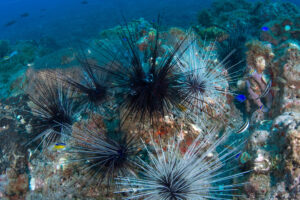Overfishing is 'eroding' tropical coral reef fish in East Africa
Snappers, unicorn fish, sweetlips, goatfish, and soldierfish are all disappearing from tropical coral reef fisheries, and it is the community of small-scale fishers that are feeling the worst of the impacts on food security and their livelihoods.
Researchers are calling for a stark shift in approach to fishing in East Africa – switching out gillnets and spearguns for more measured fishing practices – if efforts to reverse the current fortunes and restore the sustainability of domestic coral reef fisheries are going to be successful.
New science has found that overfishing is ‘eroding the sustainability’ of tropical coral reef fisheries in East Africa, and that small-scale fishers in particular are losing out as entire species disappear from their catch.
Led by scientists from the Wildlife Conservation Society and the University of Rhode Island, the new study has found that current efforts to sustainably manage individual, target fish species are not, in fact, having the kind of positive impact on the marine environment it was once hoped.
Instead, the study has argued, protecting and managing the capture of the whole community of fish in a given fishery – including its more vulnerable, schooling fish species – is a much better and far more beneficial approach.
By compiling data on fish communities from seven marine parks closed to fishing for as much as 45-years, researchers were able to set historical benchmarks of what maximum biomass and production of tropical reef fish could look like in coastal East Africa.
Comparing such fish communities in the oldest parks with those landed in the catch of local fishers, researchers have revealed “a stark loss” of fish outside of the parks, with less diversity in the fish and less overall fish in the catch.
“A key finding of our study is that current catches landed by local fishers are missing a significant portion of the fish that historically would be caught,” said Associate Professor Austin Humphries of the University of Rhode Island, an author on the study.
“The disappearance of these key fish – like snappers, unicorn fish, sweetlips, goatfish, and soldierfish – means coastal communities lose food. These diverse species provide essential proteins and micronutrients that aren’t easily replaced, threatening both food security and the livelihoods of fishing families.”

The study challenges previous management recommendations that suggested fishers should focus on targeting fast-growing species resilient to fishing pressure. These findings reveal that maintaining catches of resilient species alone does not compensate for the lost productivity of disappearing, vulnerable species.
“Many of the vulnerable species lost to fishing were social, schooling fish that often have high natural mortality and contribute significantly to total yields, while the resilient species were solitary,” said Jesse Kosgei, research scientist with the Wildlife Conservation Society Kenya’s Marine Programme.
“We found that yields were higher where schooling species were present in local fish catch, which was in managed areas that restrict some types of fishing gear. Reducing use of gillnets and spearguns that capture mostly schooling fish could help rebuild fish populations and sustain future catches.”
There had been little evidence – but a lot of hope – among fisheries biologists that fishing resilient species that are highly predictive could compensate for losses of fishing vulnerable species. However, findings from this study indicate that nearly 50% of potential fisheries production is lost when previously-caught species disappear.
“This finding argues for maintaining all or most species, and not to estimate sustainability from a few resilient target species,” said Dr Tim McClanahan, director of science for the Wildlife Conservation Trust Global Marine Programme.
Sustainability assessments of most fisheries are largely based on the status of the target species. However, McClanahan argues that because “target species are only a portion of the catch, keeping and restoring vulnerable species makes sense from an ecological and food security point of view.”
The study, titled “Fisheries Sustainability Eroded by Lost Catch Proportionality in a Coral Reef Seascape” was published earlier this week in the scientific journal Sustainability.


"*" indicates required fields
Printed editions
Current issue
Back issues

Current Issue
Issue 41 Holdfast to the canopy

Back Issues
Issue 39 Special Edition: OPY2024
Enjoy so much more from Oceanographic Magazine by becoming a subscriber.
A range of subscription options are available.








